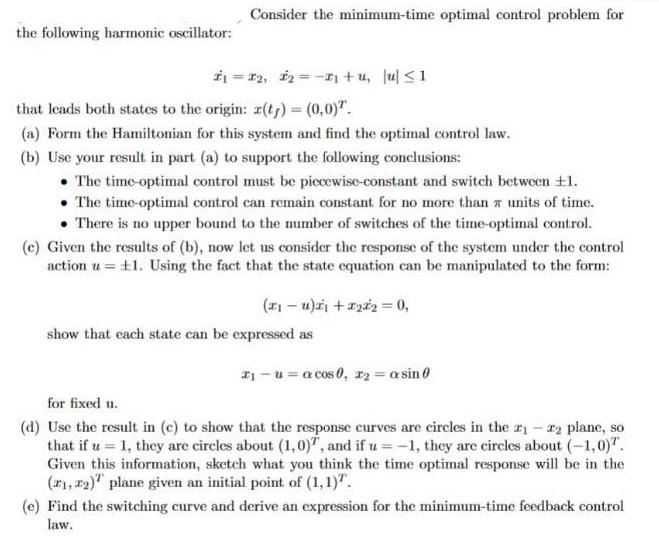Answered step by step
Verified Expert Solution
Question
1 Approved Answer
Consider the minimum-time optimal control problem for the following harmonic oscillator: 1=22, 2=-+ || 1 that leads both states to the origin: x(t)=(0,0). (a)

Consider the minimum-time optimal control problem for the following harmonic oscillator: 1=22, 2=-+ || 1 that leads both states to the origin: x(t)=(0,0). (a) Form the Hamiltonian for this system and find the optimal control law. (b) Use your result in part (a) to support the following conclusions: The time-optimal control must be piecewise-constant and switch between +1. The time-optimal control can remain constant for no more than units of time. There is no upper bound to the number of switches of the time-optimal control. (c) Given the results of (b), now let us consider the response of the system under the control action u1. Using the fact that the state equation can be manipulated to the form: (x-4)+22= 0, show that each state can be expressed as for fixed u. 21-u a cos 0, 12= a sin 0 (d) Use the result in (c) to show that the response curves are circles in the 21 - 2 plane, so that if u 1, they are circles about (1,0), and if u =-1, they are circles about (-1,0). Given this information, sketch what you think the time optimal response will be in the (1, 2) plane given an initial point of (1,1)". (e) Find the switching curve and derive an expression for the minimum-time feedback control law.
Step by Step Solution
★★★★★
3.51 Rating (158 Votes )
There are 3 Steps involved in it
Step: 1
The given problem deals with the minimumtime optimal control for a harmonic oscillator with the following dynamics dotx1 x2 dotx2 x1 u where u leq 1 and the objective is to steer the system from an in...
Get Instant Access to Expert-Tailored Solutions
See step-by-step solutions with expert insights and AI powered tools for academic success
Step: 2

Step: 3

Ace Your Homework with AI
Get the answers you need in no time with our AI-driven, step-by-step assistance
Get Started


